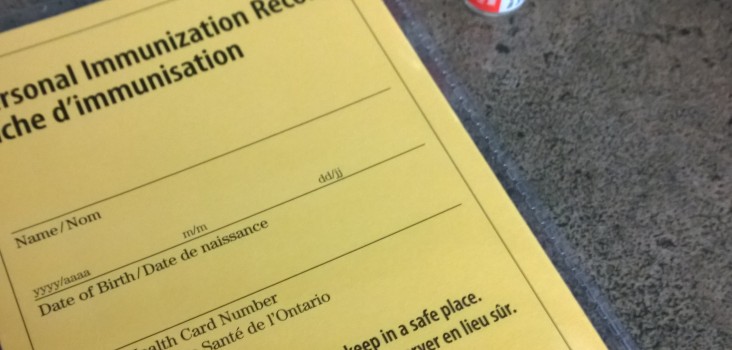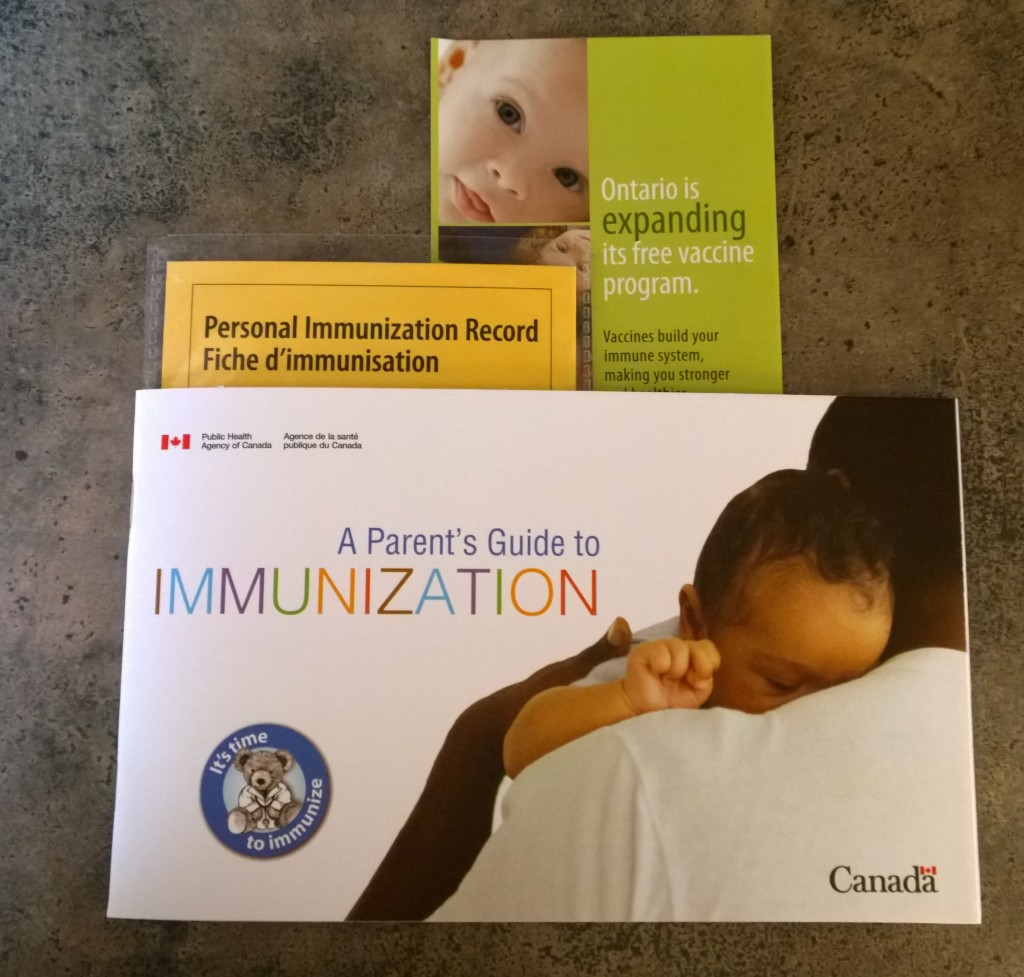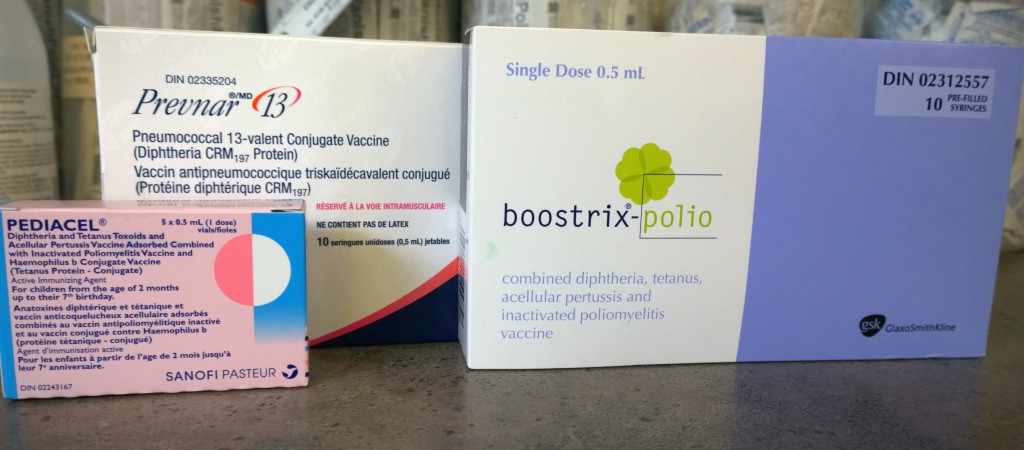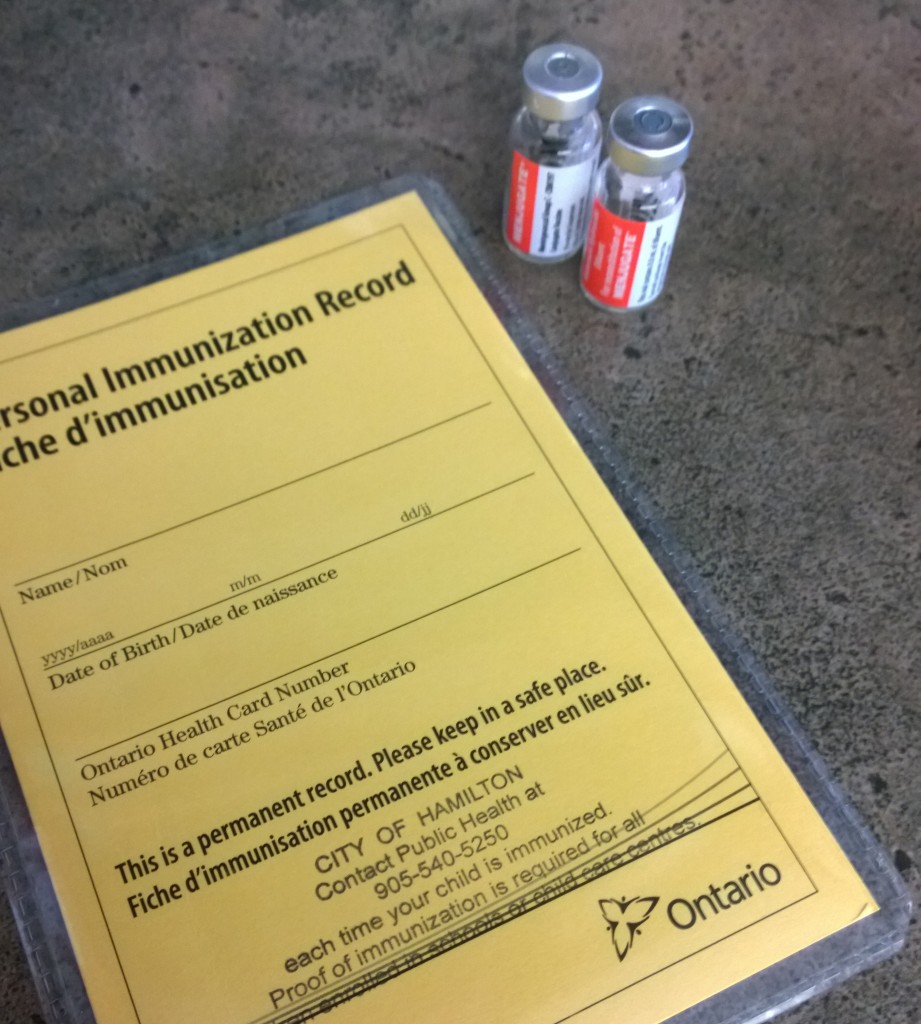March 31, 2015
Vaccination 101: Everything You Need to Know

Vaccination.
This one word has a way of drawing out raw emotions, heated arguments and debates. Today I want to speak with you about my own personal experiences with vaccinations and break down the current Ontario Immunization schedule.
As many of you know, I have been blessed to work as a Clinical Team Assistant in a family medicine unit. I have been able to bring a woman in for her first prenatal appointment and prepare the visit for her family doctor. We watch the baby grow and joke near the end of their pregnancy that it feels like they have been pregnant forever. When baby comes in for the first time you feel like they are a part of the family! Getting to hold their child warms my heart. It is incredible and humbling to be able to watch families grow over time. When a member of that family becomes ill it breaks your heart.
For many parents the problem with vaccines is the abundance of conflicting information online, the information given by a well-meaning individual and the fear of the unknown. Open and honest communication with your family health care provider is essential from the start of your pregnancy right through to your delivery and your child’s first newborn visit to ensure you feel comfortable in the decisions you make and with the relationship you have with your family health care team. Your family physician has your child’s best interests at heart. They would never prescribe your child anything that would harm them or that they would not need nor would they recommend a vaccine that could potentially harm your child. A patient becomes like a member of your family and their best interests are always the main concern for a family physician. Talk to your family health care team – if you don’t understand what you saw on the news or in a magazine bring it in to your appointment and address your concerns.
Here is some information to help you understand and appreciate the vaccination process.
What is a vaccine?
Vaccines are preparations made up of a specific selection of dead or weakened bacteria or viruses which are administered orally, by injection or through inhalation. When these dead or weakened bacteria or viruses enter a person’s system the body responds by producing antibodies that attack and kill the organisms without causing the serious symptoms that occur during a real infection.
Why do children need immunizations?
Our children are born with a degree of natural, inherited immunity which they acquire during pregnancy from their mother’s blood. That immunity is reinforced during breastfeeding as breast milk is rich in antibodies. Unfortunately, this passive inherited immunity is only temporary and wears off during the first year of life. This leaves your child open to a host of diseases.
Vaccination is the only tool that we have to prevent these diseases. Vaccines allow our body to build up antibodies to prevent diseases. We ensure our child has proper nutrition and exercise to grow strong and vaccines are the only way to ensure their immune system stays strong.
Vaccines do not make your child sick. Think of your last needle – did it hurt? It may have felt like a sting or a pinch but well worth the benefit of protecting against the disease. Both of my boys received all of their immunizations without Tylenol or Advil and developed no fever or irritability after their immunizations.
Children that cannot receive vaccines due to being immune-compromised or who are too young, count on their community for protection. Herd immunity only works when the community as a whole vaccinate.
When/Why do we receive vaccines on a certain timeline?
Your child’s vaccines are scheduled at certain developmental milestones and it is important to ensure you are staying on track with this schedule. This schedule was developed to ensure your child receives these vaccines when their body is ready for them as well as to provide protection against vaccine-preventable disease as early as possible. They are combined with important well baby visits at two, four, six, twelve, fifteen and eighteen months of age.
Let’s break down the current immunization schedule in Ontario for children up to the age of six:
Diphtheria, tetanus, pertussis, polio and Haemophilus influenza type b: The five in one protection vaccine. This vaccine given at 2, 4, 6 and 18 months protects your child from diphtheria, tetanus, pertussis (whopping cough), polio and Haemophilius Influenza type b also known as Hib which can cause meningitis.
Tetanus, diphtheria, pertussis and polio: The four in one protection vaccine. This vaccine, given at 4 to 6 years of age, protects against diphtheria, tetanus, pertussis (whopping cough) and polio.
Pneumococcal: This vaccine is given at 2,4 and 12 months of age and protects your child from pneumococcal meningitis, pneumonia, ear and blood infections.
Rotavirus: This oral vaccine is given at 2 and 4 months of age to help prevent and lessen the severity of gastro (stomach) bugs.
Measles, Mumps, Rubella: This vaccine is given at 12 months. This vaccine protects children from measles, mumps and rubella.
Measles, Mumps, Rubella, Varicella: The four in one protection vaccine. This vaccine is given between 4 to 6 years of age and protects against measles, mumps, rubella and varicella.
Meningococcal: This vaccine given at 12 months of age protects against meningitis an infection that lines your child’s spinal cord and brain.
Varicella: This vaccine is given at 15 months of age and protects against chickenpox. In some children, chickenpox can cause severe skin infections, scars, pneumonia or brain damage.
Vaccine Safety
Vaccines are constantly tested to ensure safety for patients. Patient safety is the top priority for our health care system. Vaccines do not cause disease nor do they cause autism.
Why is this important?
For many of us we can’t imagine the suffering that comes from these diseases let alone the symptoms that accompany them. This is because of how effective vaccines have been in eliminating once common and prevalent diseases.
My children will never know the scars and itchiness from chickenpox that afflicted me twice as a child. Nor will they hopefully ever lose a loved one from meningitis as my husband did when he lost his older brother as a child.
This is why we vaccinate – to prevent the preventable. It is so very important for not only the health of our children to vaccinate but the health of our most vulnerable population in our community.
This post was developed in association with the Ontario Ministry of Health and Long Term Care. The opinions of the author are my own.
Getting immunized is an important part of creating a foundation for a healthy life. If you’re on the fence about immunizing, here is the information you need to make an informed decision for your family:
How We Can Increase Vaccination Rates and Protect Our Kids
Why It’s Essential for Kids with Allergies to Be Immunized
Erica Ehm talks with Ontario’s Chief Medical Officer to Get Straight Answers about immunizations
Five Important Reasons This Pediatrician Vaccinates Her Kids – and Why You Should Too




Thank you for this Carla. We have a 4 year old daughter that as of right now is up to date on her vaccinations. However, she now has an underlying condition that may prevent us from getting her next round. Luckily that is a couple of years away and we are hoping at that point she will be able to proceed. However she may not and there are others like her that, for legitimate health reason, cannot be vaccinated. We have to count on the rest of the population to make wise decisions and protect those that cannot protect themselves.
I will say that I am against mandatory vaccinations and I hope it never comes to that. If it does I will fight along side people who’s opinions on this issue generally differ from mine immensely. But it is still my child and my decision to make.
In the mean time we just need to keep trying to educate people and debunk the dangerous myths that exist around vaccinations. And we need to do it in a respectful manner. All of the name calling and belittling that often surrounds this issue does not help a thing.